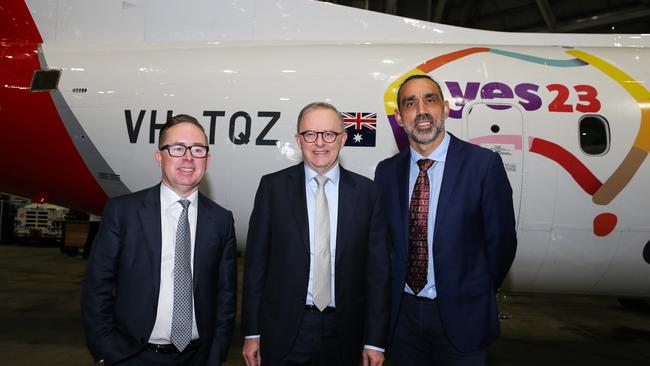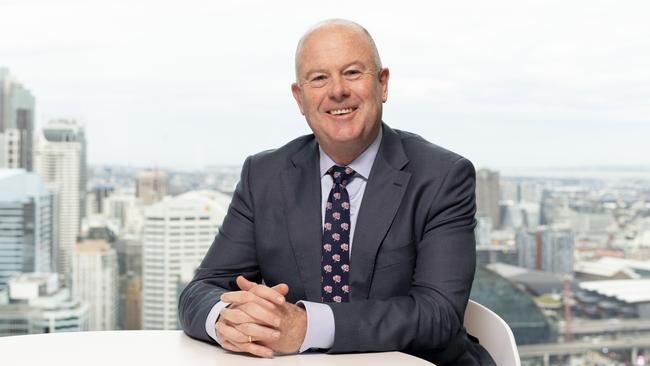KPMG CEO Outlook survey finds bosses are optimistic about growth prospects
Most CEOs are staying silent on social justice causes without the backing of boards ahead of the Voice referendum, a KPMG survey reveals.
Business
Don't miss out on the headlines from Business. Followed categories will be added to My News.
Most Australian bosses believe the public wants businesses to stay out of social justice issues, and are prepared to stay silent on causes without the backing of boards ahead of the Indigenous Voice referendum.
A survey of chief executives by professional services firm KPMG found that 44 per cent thought the public was looking for business to take the lead role from governments in societal challenges, compared to 64 per cent of CEOs globally.
Fewer leaders at 46 per cent compared with the global average of 61 per cent were prepared to take a stand on politically or socially contentious issues, if their boards had concerns, and half were prepared to divest well-performing but socially contentious parts of business.
Big business has been one of the biggest backers of the Yes campaign, with the big four banks, Wesfarmers and Qantas among those in favour ahead of the October 14 vote. Other companies including CSL, Fortescue, Goodman, Santos and Macquarie have opted to stay silent.
But while most Australian businesses contacted by The Australian were reluctant to declare an official company line on key societal issues, such as the Voice referendum, they were prepared to equip their employees with information they need to make an informed decision.
KPMG Australia CEO Andrew Yates told The Australian that striking the right balance on social causes was difficult for business leaders, particularly in the middle of a referendum.
“We are right in the middle of quite an emotive topic at the moment,” he said. “As a CEO myself, I find one of the biggest challenges you need to deal with in a modern company is what do you take a stand on behalf of your company.”

“You’ve got to try and just stay true to your values and purpose and make sure that what you’re talking about is aligned with those two things. But it’s not easy because there will always be people that either want you to say something or don’t, and finding the way through that is difficult.”
Troubled airline Qantas has been one of the biggest companies to wield its heft on contentious societal issues, even when under political pressure, which was the case during the marriage equality plebiscite in 2017. Former Home Affairs Minister, now Opposition Leader, Peter Dutton criticised then Qantas chief executive Alan Joyce at the time for advocating a company-wide position on marriage equality.
“It is unacceptable that people have used companies, and shareholders money, to try to throw their weight around in these debates,” Mr Dutton said.
“Alan Joyce, the individual, is perfectly entitled to campaign for and spend his hard earned money on any issue he sees fit, but don’t do it in the official capacity and with shareholders money.”
But Mr Joyce’s successor Vanessa Hudson has shaken off such criticism, reiterating her predecessor’s corporate philosophy at senate inquiry this week.
“We have taken social positions on things in the past, and we think, as a corporate, it‘s important that we speak out, particularly on things that we have supported for over a decade,“ Ms Hudson said.
Wesfarmers chairman Michael Chaney said in May that international investors are watching the Indigenous Voice referendum closely and will question whether Australia is a “fair place” if it fails.
Other companies, including CSL and Medibank, are taking a more nuanced view in regard to the Voice, offering their employees information, so they can make an informed decision.
“CSL is committed to working with and learning from First Nations people … (and) working with Reconciliation Australia on our inaugural Reconciliation Action Plan, which we hope to launch later this year,” a CSL spokesman said.
“Many of our employees care strongly about reconciliation and improving health outcomes for Aboriginal and Torres Strait Islander peoples. We support our employees to vote in elections and referendums as they see fit, in line with their beliefs and won’t be taking a company position at this time.”
Medibank chief executive David Koczkar supports the Voice but the insurer has also offered customers information presenting both sides of the argument on social media channels, such as Linkedin, to make up their own minds.
“We believe businesses can play a positive role in society. For Medibank, we’re seeking to make a positive impact on the health and wellbeing of our community,” a spokeswoman said.
“We acknowledge that the community, including Aboriginal and Torres Strait Islander peoples, hold varying views and opinions on the Voice proposal. We’re not encouraging people to vote a certain way, but we are encouraging them to listen and learn, and to understand what the Voice is all about – just as we have done and continue to do.”
Hancock Agriculture CEO Adam Giles told The Australian in August that the company preferred to “stay in our lane’’, and suggested spending shareholder money advocating on political matters could pose a risk to companies.
“If you’re spending two or three million dollars of shareholders’ money and profits on a political campaign which is only one side of a story, I don’t think that’s the best use of shareholders’ funds.”
The 9th edition of the KPMG CEO Outlook survey conducted between August 15 and September 15 had responses from 50 local leaders and, 1325 globally, who oversaw businesses with revenue over $US500m ($800m) and a third with $US10bn plus in annual revenue.
Leaders globally were also confident in the growth prospects over the next three years, but local bosses (64 per cent) were less optimistic about Australia’s economy than overseas (78 per cent).
“While there is some concern about rates, CEOs feel that the worst of that is behind us and the one thing that they like is certainty rather than uncertainty,” Mr Yates said. “You’d rather have certainty around things that are constraining business, but at least you know what they are, and you can adapt and deal with them accordingly.”
A higher proportion of Australians also predicted job losses, with 22 per cent of forecasting staff cuts of up to 5 per cent over the next three years, compared with 8 per cent globally.
Mr Yates said a decline in talent attraction and retention for leaders was a sign that businesses were returning to a normal operating conditions following a hiring spree upon the removal of Covid-19 restrictions.

“There was so much energy around recruiting and building up the workforce because there was such demand services right across the economy after lockdowns, but I think that has pulled back a little bit,” he said. “It feels to me that we are seeing the final post-Covid adjustment of returning back to sort of a normal sort of operating environment.
Two-thirds of CEOs globally see the end of work from home with white-collar roles to be fully back in the office within three years. In Australia, 75 per cent said they would reward employees who made the effort to come into the office with raises, promotions and better roles.
An environment of super funds and activist shareholders taking stances on companies with weak ESG polices was a concern for leaders. Eighty per cent of Australian leaders admitted that their current progress was not strong enough to withstand the potential scrutiny of shareholders. The biggest problem (30 per cent) in not meeting stakeholder expectations was the higher costs and increased difficulty of raising capital.
“The fact that the cost and difficulty of raising capital is now regarded as the top problem by CEOs if stakeholder expectations are not met illustrates how ESG is impacting directly on the bottom line,” Mr Yates said.

Investment in generative artificial intelligence was globally the number one investment priority by 70 per cent of leaders, but this was lower among local bosses at 56 per cent, who tended to see payback from investment in this area taking longer than their overseas counterparts.
Increased profitability and job creation were the two main attractions for Australian leaders in implementing generative AI, but two-thirds believed there were ethical challenges in the emerging technology.
“There is so much enthusiasm around what AI can bring, and I think it will become a bigger issue over the coming years as AI starts to generally impact the workplace,” Mr Yates said.
“As a CEO myself, cyber security is always the top of your list in terms of concerns around that. But AI was viewed as a double edged sword with many thinking that AI might help with cyber protection, but could also increase the threat.”
More Coverage
Originally published as KPMG CEO Outlook survey finds bosses are optimistic about growth prospects





